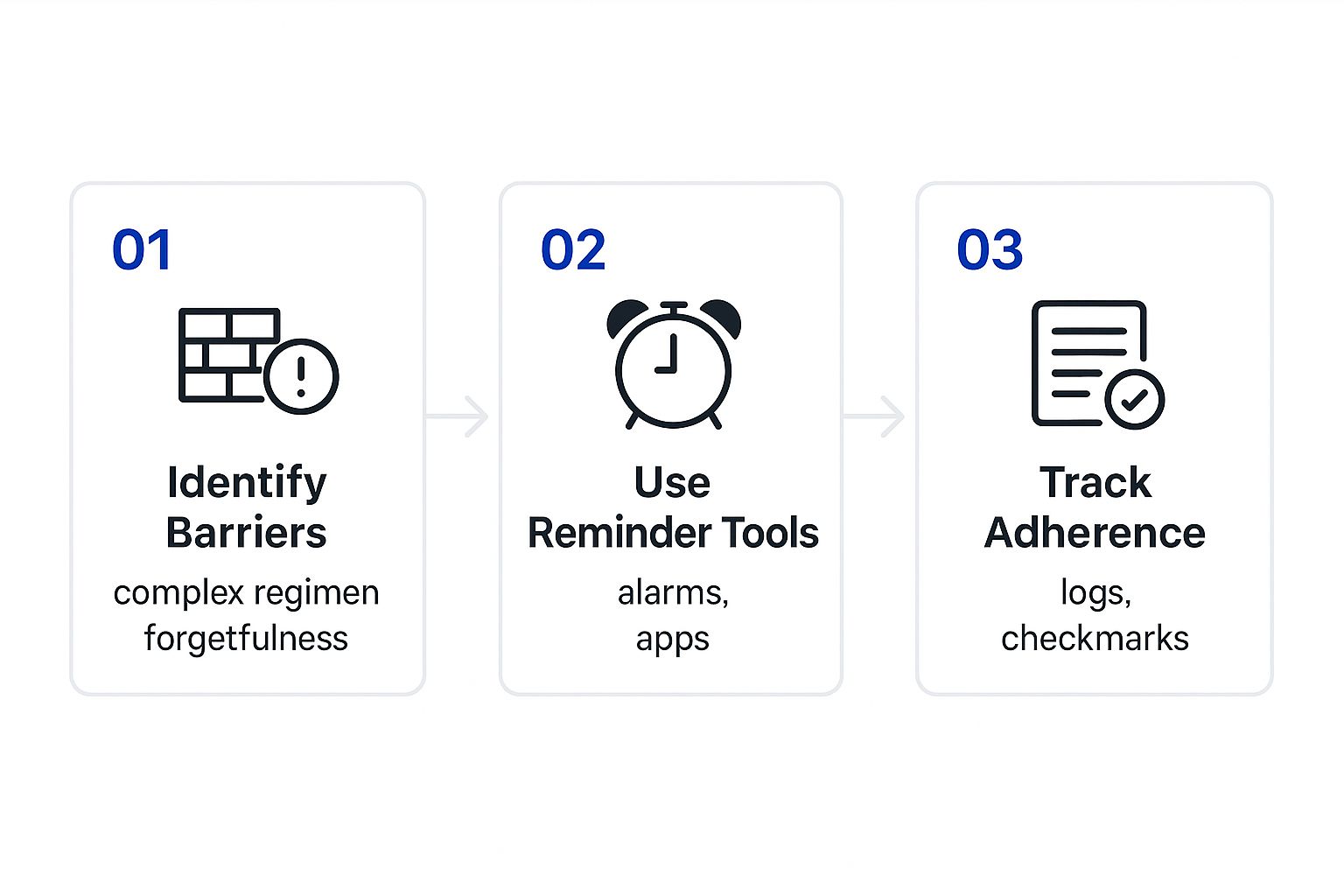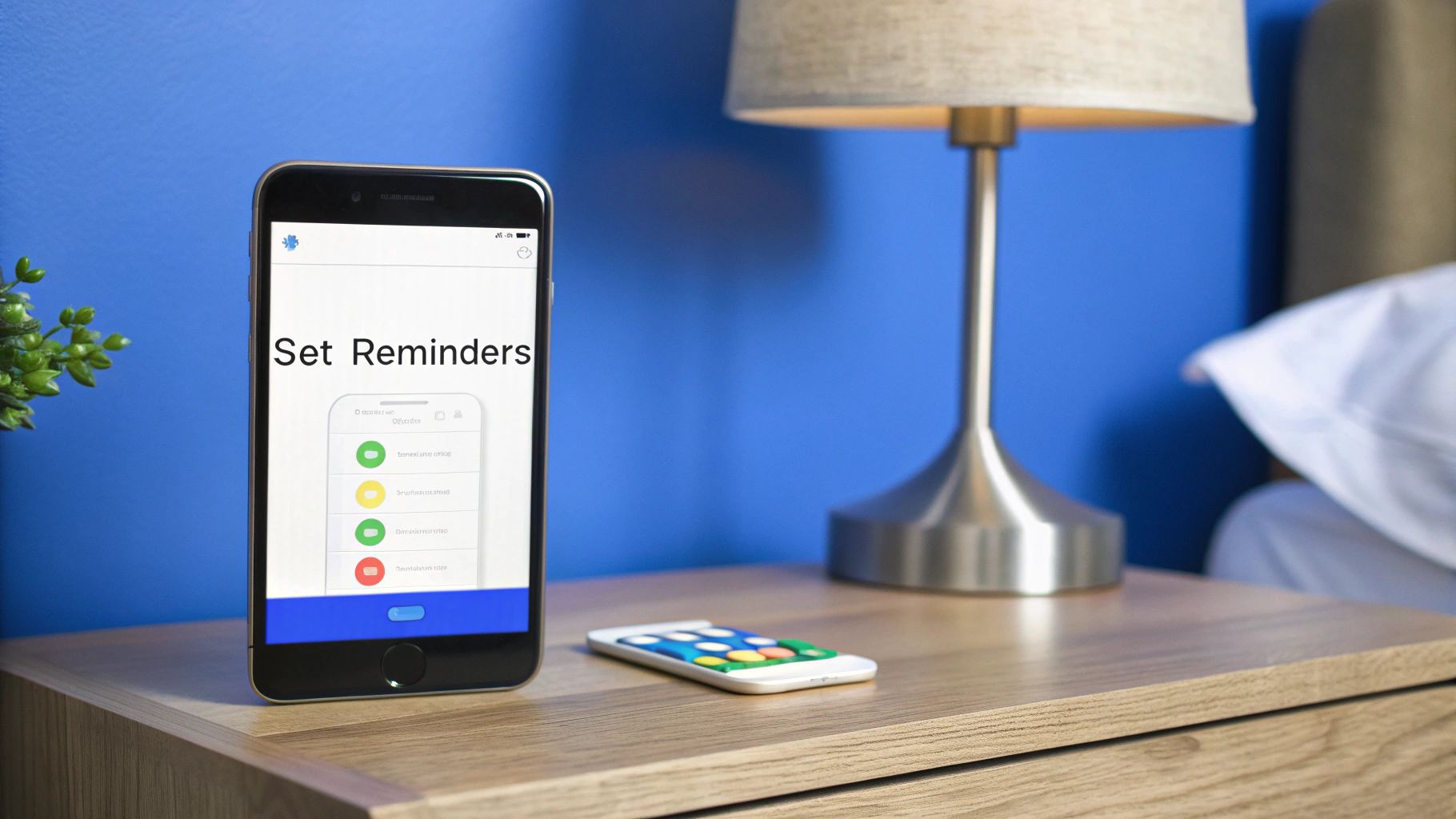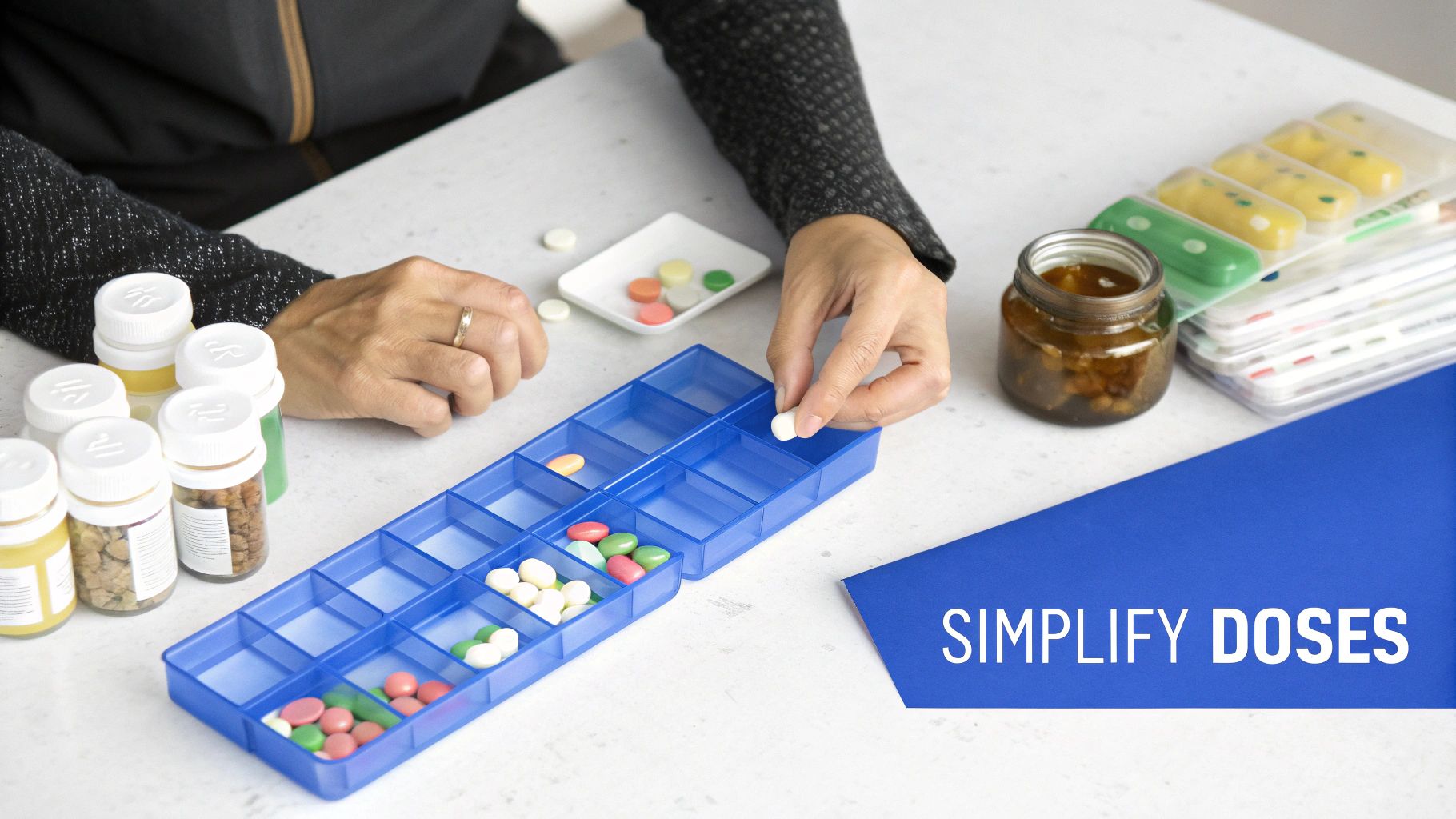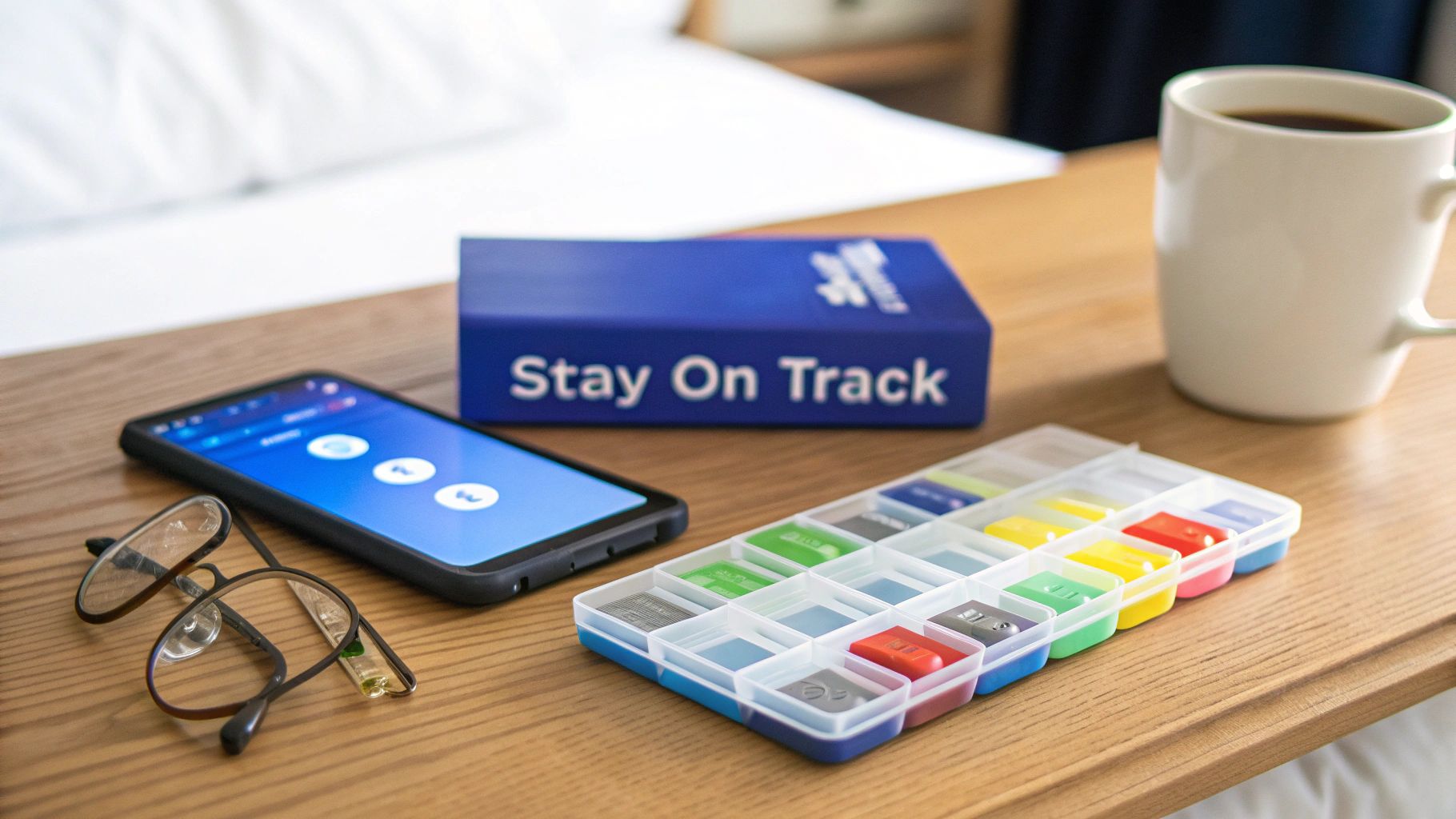Improving medication adherence really boils down to two things: building a simple, repeatable routine and working with your healthcare team to make your regimen as easy to follow as possible. It's all about turning a daily chore into a thoughtless habit and making sure your treatment plan is clear and uncomplicated.
Why Sticking to Your Medications Matters

We've all been there—life gets busy, schedules get jumbled, and a dose gets missed. It happens. But consistently taking your medication exactly as prescribed is one of the most powerful things you can do for your health. This isn't just about "following doctor's orders"; it's about actively taking the reins of your own well-being.
When you stick to your medication schedule, you’re giving that treatment the absolute best chance to do its job. This has a direct impact on your health in several crucial ways.
Preventing Disease Progression
For chronic conditions like high blood pressure, diabetes, or heart disease, medications are your first line of defense. They work around the clock to manage symptoms and, more importantly, stop the condition from getting worse. Missing doses can let a manageable issue spiral, leading to much more serious health problems down the road.
Proper adherence keeps things stable. Think of it like maintaining your car—you get regular oil changes to prevent the engine from failing. In the same way, consistent medication helps prevent major health breakdowns and keeps your body running as smoothly as possible.
Avoiding Costly Hospital Visits
The link between missing medications and ending up in the hospital is incredibly clear. A huge percentage of hospital admissions are tied directly to patients not taking their medications correctly. This can happen when symptoms flare up, from bad reactions due to improper dosing, or when new complications arise from a condition that’s no longer under control.
This is a massive healthcare challenge, with nonadherence rates sometimes hitting 50%. That means up to half of all patients aren't taking their meds as prescribed. The fallout is serious: nonadherence is connected to nearly 69% of all medication-related hospitalizations and creates a huge financial strain from increased medical costs. If you want to dig into the numbers, you can explore the research on medication adherence trends.
By simply taking your medication on time, every time, you are actively lowering your risk of an unexpected and expensive trip to the ER or a lengthy hospital stay. It’s a simple preventative step that protects both your health and your wallet.
Gaining Control and Improving Quality of Life
Beyond the clear clinical benefits, sticking to your treatment plan is just plain empowering. It gives you a real, tangible sense of control over your health journey. When you feel better and your symptoms are managed, your overall quality of life skyrockets. You have more energy, more independence, and more freedom to do the things you love every day.
This guide is all about offering supportive, practical solutions. We believe that learning how to improve medication adherence starts with small, doable changes that add up to significant, lasting improvements in your health and peace of mind.
Build a Routine That Actually Works for You
Relying on sheer willpower to remember medications is a recipe for frustration. A much more effective approach is to build a routine that makes taking them feel effortless and automatic. We need to move beyond just setting a phone reminder and dive into the practical psychology of habit formation.
This strategy helps you learn how to improve medication adherence by making it a seamless part of your day—not a chore you have to force yourself to remember.
Create a Dedicated Medication Station
One of the simplest yet most powerful steps is to create a dedicated, visible "medication station" in your home. This isn't just about stashing pills in a drawer; it's about creating a physical cue that prompts action.
Choose a spot you interact with every single day without fail, like next to your coffee maker or on your bedside table. By placing the pill organizer, a glass of water, and any other needed supplies together in this high-traffic area, you make the process frictionless. You see it, you do it. There's no need to search for anything, which removes a common barrier.
Master the Art of Habit Stacking
A brilliant technique for building new habits is called habit stacking. Instead of trying to create a new routine from scratch, you simply link your medication time to a habit you already do every day without thinking.
For example, if you never miss your morning cup of coffee, your new rule becomes: “After I start the coffee maker, I will take my morning pills.” The existing habit (making coffee) becomes the trigger for the new one (taking medication).
This works for any established routine:
- Morning: "After I brush my teeth, I will take my medication."
- Evening: "Right before I get into bed to read, I will take my evening dose."
- Mealtimes: "As soon as I sit down for lunch, I will take my midday pills."
The goal is to make taking your medication as automatic as turning off a light when you leave a room. By piggybacking on a strong, existing habit, you bypass the need for constant mental reminders and reduce decision fatigue.
This simple process flow outlines the basic steps to improve adherence by identifying issues, using tools, and tracking progress.

By following this systematic approach, you can transform a complex challenge into a series of manageable actions. For a deeper look into organizing care, check out our guide on creating a comprehensive care plan.
Use Technology to Support Your Health Habits

From simple pill cases to advanced smart devices, technology offers a whole range of powerful tools to help you or a loved one stay on track with medications. The real trick is finding what fits your comfort level and lifestyle. After all, the technology should serve you, not the other way around.
Sometimes the simplest solutions are the most effective. A basic weekly pill organizer is often the best first step. When you sort pills once a week, you eliminate the daily frustration of fumbling with multiple bottles and slash the risk of taking the wrong dose. It’s a wonderfully simple visual cue that shows, at a glance, whether the day's medications have been taken.
Choosing the Right Medication Reminder App
For anyone comfortable with a smartphone, medication reminder apps can be an absolute game-changer. These tools are becoming incredibly popular, which tells you a lot about the need for them. In fact, the global medication adherence market was valued at $3.86 billion in 2024 and is expected to keep growing. You can discover more about these market trends and their impact on health outcomes.
When you're looking for an app, try to find one with features that go beyond a simple alarm:
- Customizable Alerts: Can you pick your own sounds, use a snooze option, or set persistent notifications that don't just disappear? A good app lets you tailor alerts to your own life and schedule.
- Tracking Logs: Being able to mark a dose as "taken" creates an invaluable log. This record is not only helpful for you but can also give your doctor a crystal-clear picture of your adherence.
- Refill Reminders: Many apps will ping you when your prescription is running low. This small feature can be a lifesaver, helping you avoid last-minute pharmacy runs and gaps in your treatment.
- Caregiver Integration: Some platforms allow a family member or caregiver to link up their account. They can get a notification if a dose is missed, offering a supportive backup without having to constantly check in.
Exploring Advanced Solutions
If you or a loved one is managing a particularly complex medication schedule, it might be worth exploring more advanced tools. These go beyond just reminders to actively help with the dispensing process.
Key Insight: The best technology is the one you will actually use consistently. A complex system that causes frustration is less effective than a simple, reliable one. Start with the basics and only add more advanced tools if a clear need arises.
Smart pill dispensers are automated devices that hold and release medications at pre-programmed times. They often lock the remaining pills away until the next scheduled dose, which is fantastic for preventing accidental double-dosing.
Here are some of the features to look for in these more advanced systems:
| Feature | What It Does | Why It's Helpful |
|---|---|---|
| Automated Dispensing | The device releases the correct pills at the correct time. | Completely removes the need to manually sort pills for every single dose. |
| Audio and Visual Alerts | Flashing lights and sounds signal that it's time for a dose. | Grabs attention effectively, which is vital for those with hearing or vision loss. |
| Caregiver Notifications | The system sends a text or app alert if a dose is missed. | Provides peace of mind and allows family or caregivers to step in when needed. |
Ultimately, whether you choose a plastic pillbox or a smart dispenser, bringing technology into the mix is a proven way to improve medication adherence. It builds another layer of support into your daily routine, making it that much easier to stick to your health plan. For more helpful resources, you might find our visual guides and checklists useful for your caregiving journey.
Talk to Your Healthcare Team About Simplifying Your Regimen
Let's be honest: a complicated medication schedule is one of the biggest hurdles to taking your pills correctly. Trying to juggle multiple medications, different doses, and confusing timings can feel like a full-time job. But you're not just a passive patient; you're a key player on your own healthcare team. Your input is crucial for creating a plan that actually works for you.
Your doctor and pharmacist are your best allies in this. They genuinely want your treatment to be successful, but they can't help with problems they don't know exist. If your routine feels overwhelming, you need to speak up.
Open Up the Conversation
The next time you have a doctor's appointment, go in ready to talk about your medication schedule. The goal is to work together to cut down the complexity and make your routine as simple as possible. It might surprise you how much a single conversation can improve your daily life.
Try asking direct, solution-focused questions. For example:
- "I'm having trouble keeping track of everything. Is it possible to switch any of my medications to a once-a-day version?"
- "Could we do a full medication review to see if there's anything we can safely stop or reduce?"
- "Are there any combination pills that could replace two of my separate prescriptions?"
Questions like these give your doctor a clear signal that you need to simplify things.
It's a widespread issue. A study from the Lown Institute revealed that nearly 40% of seniors take five or more prescription drugs every day. This situation, often called polypharmacy, makes simplifying the regimen a critical step for safer, more effective care.
Your Pharmacist is a Powerful Resource
Don't overlook your pharmacist. They are an incredibly valuable—and often underused—partner in making your routine manageable. A great first step is to move all your prescriptions to one pharmacy. This gives your pharmacist a complete view of what you're taking, helping them catch potential drug interactions and streamline your refills.
Once you have a go-to pharmacy, ask about services designed to make your life easier:
- Blister Packs: Many pharmacies can pre-package your pills into blister packs, organized by date and time of day (morning, noon, evening, bedtime). This takes the guesswork out of sorting pills and gives you a quick visual check of what you've already taken.
- Synchronized Refills: Ask about "med sync." This fantastic service lines up all your refill dates so you can pick up every prescription on a single day each month. No more multiple trips to the pharmacy or worrying about running out of a critical medication unexpectedly.
By working actively with your doctor and pharmacist, you can turn a confusing, hard-to-manage schedule into a simple routine that truly supports your health.
Practical Support Strategies for Caregivers

When you're helping a loved one manage their medications, it's a delicate dance between offering support and respecting their independence. Your role isn't to be a manager, but a partner. The goal is to create a sense of teamwork, not tension.
Think about the difference in tone. Asking, "Did you take your pills?" can come across as accusatory, even if you don't mean it to. But what if you shifted the language slightly?
Try framing it as a shared goal. Something as simple as, "Have we taken care of our morning medications yet?" turns it into a team effort. This small change goes a long way in preserving dignity and reducing the friction that can come with managing a complex health routine.
Foster a Collaborative Conversation
Open, honest communication is the most powerful tool in your caregiving toolkit. If your loved one is forgetting doses or seems resistant, it’s rarely about defiance. More often, it’s a sign that something is wrong. They might be dealing with unpleasant side effects, finding the pills hard to swallow, or just feeling completely overwhelmed.
Approach the conversation from a place of genuine concern. Instead of leading with the missed dose, start with curiosity. You could say, "I've noticed it's been a bit tricky to keep up with that new heart medication. How is it making you feel?"
This opens the door for them to share what's really going on, especially if they’ve been hesitant to bring it up.
Caregiver Insight: The aim is to be a supportive ally, not an enforcer. When you truly listen to their concerns and validate their experience, you build the trust needed to solve problems together and improve medication adherence for good.
Set Up Systems That Work for Both of You
Once you've established that open line of communication, you can start putting practical tools in place to make life easier.
Shared digital calendars are fantastic for keeping track of doctor's appointments and medication schedules. You can even set up joint reminders that ping both of your phones, acting as a gentle, automated nudge.
Another incredibly effective strategy is creating a central, organized medication station.
- Use a clear pill organizer sorted by day and time of day (morning, noon, evening, bedtime).
- Keep it in a highly visible, agreed-upon spot, like the kitchen counter next to the coffee maker.
This simple visual system provides a quick, at-a-glance answer to whether the pills for that time have been taken. For more help organizing your caregiving efforts, our visual guide on creating a caregiving plan can be a fantastic resource.
Most importantly, stay observant. If missed doses keep happening or you notice new health issues cropping up, it might be a sign that the current system isn't enough. Don't hesitate to bring your notes and observations to their next doctor's appointment. Your insights provide the healthcare team with a complete picture, which can lead to crucial adjustments like simplifying the schedule or exploring a different treatment.
Your Questions About Medication Adherence Answered
Even with the best routines and tools in place, life happens. It's only natural for questions or unexpected situations to pop up that can throw a wrench in your medication schedule. Let's tackle some of the most common questions we hear from families, providing clear, practical answers to help you stay on track.
Navigating these real-world challenges is often what makes the biggest difference in sticking with a medication plan for the long haul. Here's a quick look at the topics we'll cover.
FAQ Topics at a Glance
| Question Topic | Quick Summary of Answer |
|---|---|
| Missed Doses | Generally, take it if you remember within an hour or two. If it's close to the next dose time, skip the missed one. Never double up. Always call your pharmacist if unsure. |
| Traveling with Medication | Plan ahead by packing extra, keeping meds in your carry-on, adjusting for time zones, and carrying a written list of all medications and dosages. |
| Technology's Role | Technology, especially smart dispensers and apps, is a powerful and growing tool for improving adherence. The market is projected to reach $16.46 billion by 2032. |
Now, let's get into the details for each of these common concerns.
What Should I Do If I Miss a Dose?
This is easily one of the most frequent and stressful questions. The honest answer is: it depends. The right move hinges on the specific medication and how much time has gone by since the scheduled dose.
As a general rule of thumb, if you remember within an hour or two, it's usually fine to take the missed dose. However, if you’re already nearing the time for your next scheduled dose, the safest move is often to just skip the one you missed and get back on your normal schedule.
The one thing you must never do is double up. Taking two doses at once to "catch up" can be incredibly dangerous, potentially leading to an overdose or amplifying side effects. Just don't do it.
Crucial Takeaway: When in doubt, call your pharmacist. They are your absolute best resource for this question. Keep their number programmed in your phone for a quick call. They can give you precise advice based on the exact medication you're taking.
How Can I Manage Medications While Traveling?
Traveling is wonderful, but it can completely upend even the most well-established routine. The key to making sure you don't skip a beat with your medications while away from home is simple: plan ahead.
Here's a quick checklist to make it easier:
- Pack Extra: Always, always bring more medication than you think you will need. This gives you a buffer for unexpected travel delays, a lost pill, or even an extended trip.
- Keep It with You: This is non-negotiable. Never pack essential medications in your checked luggage. Keep them in your carry-on bag or personal item to prevent a disaster if your luggage gets lost.
- Adjust for Time Zones: If you're flying across several time zones, chat with your doctor or pharmacist before you leave. They can help you map out a temporary schedule to keep your doses properly spaced.
- Carry a List: Always have a physical or digital list of all your medications, the dosages, and your doctor's contact information. This is invaluable if you need to see a doctor or visit a pharmacy unexpectedly.
Can Technology Really Help Improve Adherence?
Absolutely. In fact, technology is becoming a vital part of modern healthcare, especially for helping people manage their health and chronic conditions right from home. The market for tools designed to help people stick to their medication schedules is booming for a simple reason—they work.
This isn't just about a few random apps. It's a significant focus in the healthcare industry. The global medication adherence market was valued at a massive $4.5 billion in 2023 and is expected to climb to $16.46 billion by 2032. Hardware, like smart pill dispensers, is a huge part of this growth, which shows just how much people are coming to rely on these tools. You can read more about how technology is reshaping patient care and the trends driving it.
Sticking to a medication schedule can be tough, but you and your family don't have to figure it out alone. If you or a loved one in Mercer County needs compassionate, professional support at home, NJ Caregiving is here to help. Our dedicated caregivers can assist with medication reminders, personal care, and much more, providing safety and true peace of mind. To learn how we can support your family's unique needs, visit us at https://njcaregiving.com.


